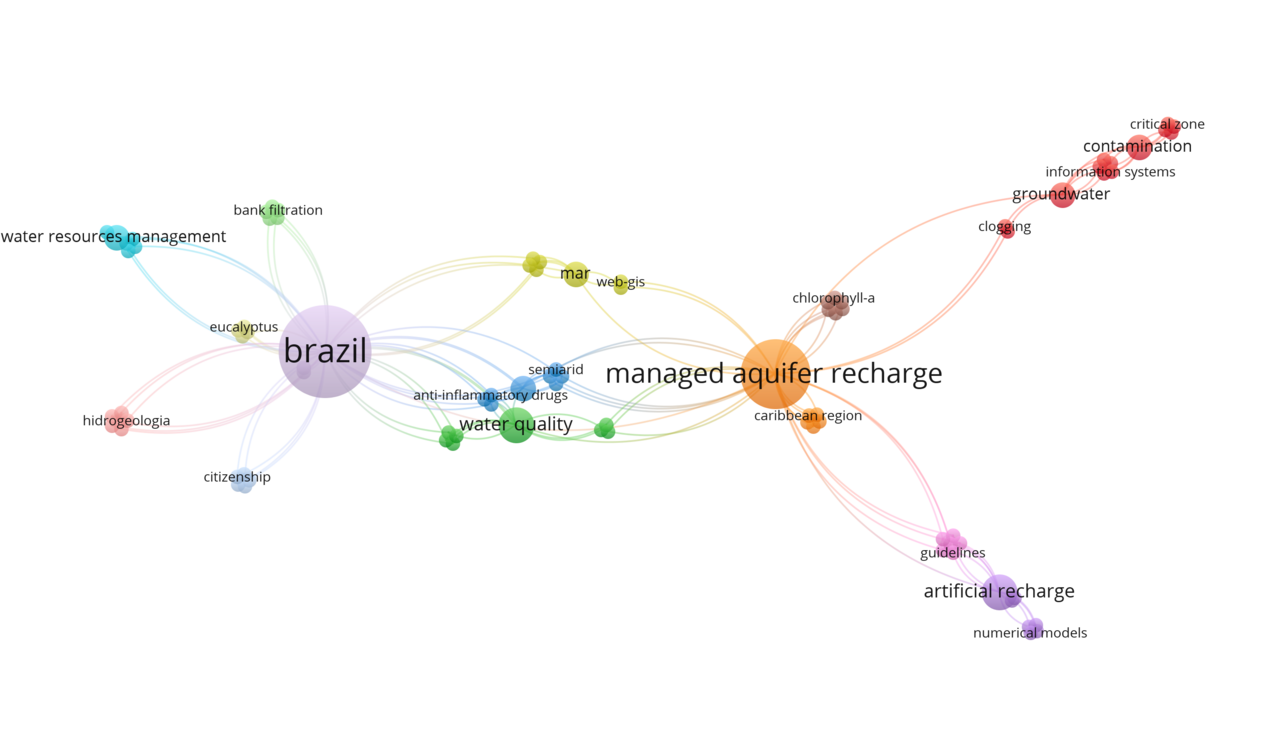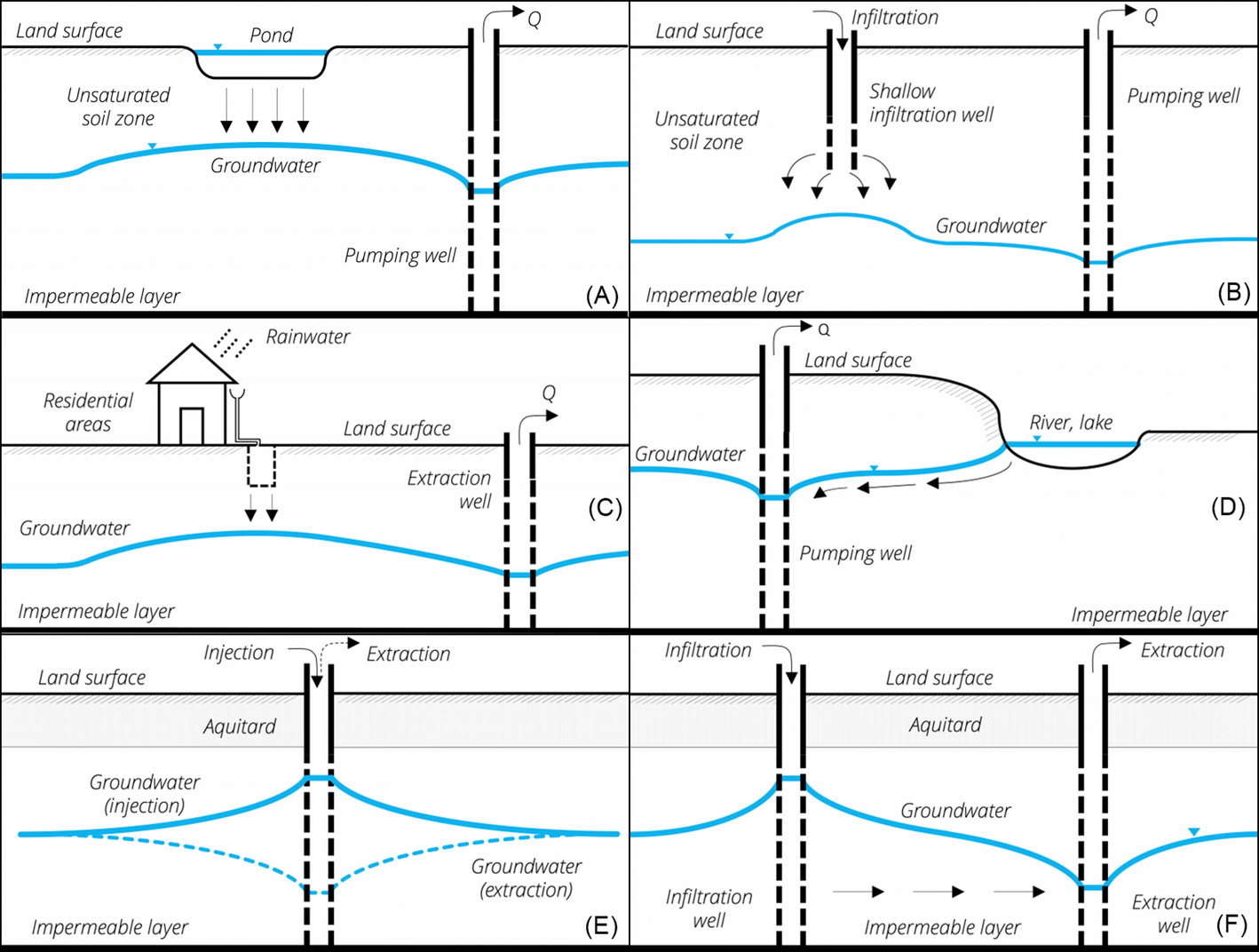Three decades searching for a managed recharge solution for Brazil’s invisible waters
Published in Earth & Environment and Sustainability

The Paradox of Abundance and Scarcity
Brazil holds one of the world’s largest freshwater reserves, yet suffers frequent water crises. Groundwater is increasingly used, but most wells are informal and unmonitored. MAR offers a strategic way to intentionally replenish aquifers—but remains absent from national policy.
Managed Aquifer Recharge?
Yes! Managed Aquifer Recharge (MAR) is the intentional storage of surface water into underground aquifers for later use. Unlike natural recharge, MAR uses engineered systems like infiltration ponds and injection wells to enhance groundwater availability.
It reduces evaporation, improves water quality through natural filtration, and supports drought resilience. However, the MAR strategies are still lacking in Brazil’s water management policies.
Mapping Thirty Years of MAR Research in Brazil
We reviewed thousands of articles to identify MAR-related studies in Brazil, mapping techniques, regional applications, and research gaps to understand how MAR is being explored in the country.
Fragmented Knowledge on Aquifer Recharge in Brazil
Scientific research on MAR in Brazil remains limited and dispersed. Most documented cases are small-scale and rural, using infiltration ponds, open wells, and riverbank filtration. The Northeast and other semi-arid regions are the most studied, reflecting their chronic water stress. São Paulo, despite being the most populous state and a major groundwater user, has relatively few MAR publications so far - though research is beginning to expand.

Simple recharge techniques, like small infiltration dams and subsurface dams, are widely implemented but underrepresented in academic literature. While current studies are scattered, the growing network of researchers shows potential for stronger collaboration and integration in the near future.
A Strategy Still Missing
Although MAR offers clear benefits for drought resilience and water security, Brazil still lacks a coordinated national strategy to support its implementation. Existing policies are limited and fragmented, and recharge practices are often treated as isolated or experimental efforts.
Pilot projects remain scarce and are rarely monitored or publicly disseminated. Without clear standards, regional assessments, and integration into water governance, MAR continues to be overlooked in formal planning.
To unlock its full potential, Brazil needs targeted policies, technical guidance, and inclusive planning - especially in regions most vulnerable to climate change.
From Knowledge to Action
This review was developed by researchers from the University of São Paulo’s (USP) Groundwater Research Center (CEPAS), within Project SACRE – Integrated Water Solutions for Resilient Cities. Supported by FAPESP, CNPq, and USPSusten, the team works to advance MAR in Brazil by translating research into actionable frameworks and promoting its integration into planning, regulation, and locally adapted water management practices.
Read the Full Study
Explore the complete article at Discover Water.
Follow the Topic
-
Discover Water

This journal is part of the Discover journal series. It is an open access, community-focussed journal publishing research from across all fields relevant to water research.
What are SDG Topics?
An introduction to Sustainable Development Goals (SDGs) Topics and their role in highlighting sustainable development research.
Continue reading announcementRelated Collections
With Collections, you can get published faster and increase your visibility.
Integrating Water, Energy, Food and Ecosystem Services (WEFE) towards Sustainable Nexus Water Management
This collection seeks research or review papers on WEFE Nexus approaches in water management, aiming to enhance resilience and sustainability. Globally, many regions face increasing pressures on water resources due to climate change, population growth, and intensive human activities. These factors often lead to conflicts and inadequate mitigation measures, exacerbated by insufficient data. Unsustainable water management practices strain resources, leading to wastage, declining aquifer levels, and environmental degradation. Addressing these challenges requires an integrated approach, considering economic, social, and environmental factors. Solutions must adopt a holistic approach to the WEFE interplay to achieve impact, with a pragmatic consideration of financial feasibility, economic return, sustainable resource use, and social acceptance.
Potential scientific topics for submitted papers may include:
• Analysis of governance structures and policy frameworks for integrated management of water, energy, food, and ecosystem services.
• Investigation of the unique challenges and strategies for managing the WEFE Nexus in urban environments, including water supply, energy demands, food security, and ecosystem preservation.
• Assessment of climate change impact on water resources, energy production, food security, and ecosystem services, and exploration of potential adaptation and resilience strategies for the WEFE Nexus.
• Strategies and measures for safeguarding access, fairness, and equity in resource allocation towards WEFE Nexus security.
• Circular economy and zero waste approaches to optimize resource use and minimize waste within the WEFE Nexus, including water reuse, energy recovery, and food waste reduction.
• Interactions between water, energy, food, and ecosystem services and their impacts on biodiversity, ecosystem health, and ecological balance.
• Local/regional community engagement and participation of stakeholders in WEFE Nexus management, including case studies of successful community-led initiatives.
• Analysis of international and transboundary challenges in managing the WEFE Nexus, including geopolitical conflicts over shared water resources and opportunities for cooperation.
• Investigation of technological innovations such as sensor networks, data analytics, and precision agriculture for optimizing resource use and enhancing efficiency within the WEFE Nexus.
• Assessment of the economic value of ecosystem services provided by water resources, such as water purification, flood regulation, and habitat provision, and exploration of methods for incorporating these values into decision-making processes.
Keywords: WEFE Nexus; water resources management; irrigation water; modelling; agroecology; environmental economics; stakeholder engagement; water conflict; hydro-diplomacy; ecosystem services; water governance.
This Collection supports and amplifies research related to SDG2 (Zero Hunger), SDG6 (Clean Water and Sanitation), SDG7 (Affordable and Clean Energy), SDG12 (Responsible Consumption and Production), SDG13 (Climate Action), and SDG15 (Life on Land).
Publishing Model: Open Access
Deadline: Jun 30, 2026
Biological Treatment of Emerging Contaminants in Industrial Wastewater: Challenges and Innovations
Emerging contaminants in industrial wastewater are pollutants of growing concern due to their potential environmental and health risks. These substances, often inadequately removed by conventional treatment processes, include pharmaceuticals, personal care products, microplastics, heavy metals, and industrial chemicals such as polyfluoroalkyl substances (PFAS). As industrial activities expand, these contaminants increasingly threaten water quality and ecosystem health. Addressing these challenges requires advanced treatment technologies and a comprehensive understanding of their impacts on both human and environmental well-being. The biological treatment of emerging contaminants in industrial wastewater offers a sustainable and efficient alternative where conventional treatments often fall short.
Keywords: Emerging contaminants, Industrial wastewater, Pharmaceuticals, Microplastics, Endocrine disruptors, Heavy metals, PFAS, Advanced treatment technologies, Environmental impact.
This Collection supports and amplifies research related to SDG 3, SDG 6, SDG 12, and SDG 13.
Publishing Model: Open Access
Deadline: Mar 30, 2026



Please sign in or register for FREE
If you are a registered user on Research Communities by Springer Nature, please sign in